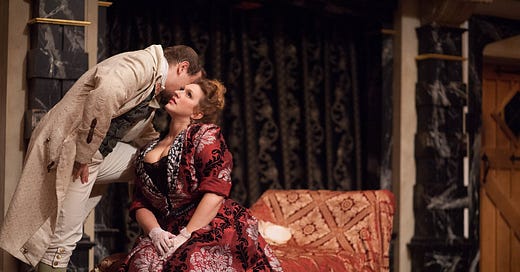William Wycherly's Restoration play The Country Wife is filthy and profane and everything that the deposed Puritan regime would have condemned. One character fakes impotence to seduce wives. An urban husband marries the title character for her innocence. Sadly for her urban husband, innocence doesn't stop her from fucking other men. Wycherly even manages to make an obvious c-word pun out of the title. It's definitely a product of its era.
“The Country Husband” is also of its era, a tale of suburban parties and proscribed gender roles. Like that play, it eviscerates myths of the happy traditional marriage. The protagonist Francis Weed is constantly harried by the women of Shady Hill to the point where his least anxious moments are the few times when he's not dealing with women – including the beginning when he's almost in a plane crash.
Little Girls
In the first pages, Francis Weed's plane makes an emergency landing. In Francis' imagination, it's a plane crash. After a trip through Philadelphia, New Jersey and New York, he finally arrives home to find his children fighting. His son kicks his daughter Louisa in the butt. When Louisa yells “damn you,” Francis makes the mistake of scolding Louisa for the language. Louisa throws a fit because seriously, why would her dad have a bigger problem with “damn you”? Also, Louisa hit her brother first but he messed up her China collection. They go back to fighting and push the youngest brother into a cabinet.
Louisa is a refreshing change from other Cheever children. Often, Cheever writes children as arbiters of his parental insecurity. Cheever's fictional children die or run away from drunk parents. As perspective characters, they see all their parents' faults without participating. Louisa, by contrast, is a stubborn brat. She's not going to let her brother push her around. She's certainly not going to accept being scolded for yelling “damn you.”
By contrast, Gertrude is a force of nature. “Opening your door in the morning, you would find Gertrude sitting on your stoop. Going into the bathroom to shave, you'd find Gertrude using the toilet.” Gertrude grabs babies to push around in their strollers. Gertrude is skinny and dirty with ragged clothing. Not only did Gertrude wander through Shady Hill houses as if she owned them, she wouldn't leave until someone told her to leave, often repeatedly. The story leaves with calls of “go home Gertrude.”
Even worse, Gertrude's family is wealthy and functional. If they were poor or divorced or drunk, the Shady Hill neighbors would tolerate her. They might even welcome her. With happy parents, Gertrude goes beyond nuisance to barely tolerated delinquent. She's definitely one of the most memorable characters in Shady Hill.
Teenage Girls
“Why you trolling like a b!tch? Ain't you tired?
Tryna strike a chord and it's probably A-Minor”
Francis' teenage daughter has a paragraph. Francis disapproves of her reading True Romance magazine. She also comes down to dinner with a jaded look. One would think that a teenage daughter would keep him from chasing after teenage girls but it never works that way. Too many adult men think nothing of chasing after teenagers. Kendrick Lamar mocks Drake for it, but who was around to mock all the men who creeped on Brooke Shields in the 1970s. Why was Pauline Kael the only contemporary critic who rightly criticized Manhattan for the central story? The inventors of the “how long til 18 and legal” countdowns should apologize every day to Lindsay Lohan and the Olsen Twins.
At least Francis knows he's wrong to chase after Ann Murchison, the teenage babysitter who replaces the ever-nosy Ms. Heinlen. He even mentions statutory rape. Thankfully, most of his predatory moves are internal. He hugs her when she talks about her awful father and kisses her after walking her to her door, but he rarely has the opportunity to do more. He buys her jewelry. Gertrude interrupts his advances.
When he learns that the neighborhood charity case, Clayton Thomas, is planning to marry Ann, he does all he can to destroy Clayton's future. Not only does he refuse to give Clayton a job recommendation, he tells everyone and anyone that Clayton is a shiftless lazy kid who can't be trusted.
Francis is a self-justifying monster, but how often is this behavior normalized even 70 years later? Teenagers can be cute, but they aren't fully formed. They are raging hormonal monsters with bad skin and mood swings. Yet, middle aged men like Francis delude themselves into thinking that they are in love because they don't want to admit that they are want easily manipulated victims.
Adult Women
Francis' wife, Julia, provides a sane counterpoint. Francis is having existential crises. Julia just wants to make sure that her children are healthy in a clean house. She certainly doesn't want to deal with Francis' drama or his cold war with a dog. Like housewives on modern sitcoms, she scolds her husband as she cleans up after him. She even accuses him of purposefully leaving his clothing laying around to anger her.
Toward the end of the story, Francis hits her and as she's packing to leave, they argue about who needs whom more. She's certain that he'd collapse in a pile of clothing, isolation and greasy ties without her. She stays because she's convinced herself that he needs her and after four children, she's used to being a mother.
There are two other women in the story – the Farquarsons' maid and Mrs. Wrightson - highlight Francis' inability to deal with the domesticity of the suburbs. The suburban world of dinner parties and homemaking drive Francis to distraction. Francis recognizes the Farquarsons' maid from the war. She was either a nazi's mistress or she looks enough like the collaborator to remind Francis. Once liberated, the town shaved her head and publicly shamed her. Francis would love to tell the story of the best time of his life, but he knows better. “The people in the Farquarsons' living room seemed united in their tacit claim that there had been no past, no war – there there was no danger or trouble in the world.”
Cheever's stories often sideline WWII. In “Torch Song” a character leaves for the war and comes back in a sentence. A character from “The Day the Pig Fell into the Well” dies in the war. The Italian nobility of “The Bella Lingua” heroically sacrificed their health to resist the nazis but serve as irritants. The page and a half where Francis muses on a nazi collaborator is probably the most attention Cheever pays to WWII.
Mrs. Wrightson truly underscores how far Francis has fallen from his soldier days. She sees him on the train platform and starts talking about her curtains. She interrupts him peeping into an open window with a naked women. He thinks that she's old, past the point of fuckability. She's talking about curtains. So he insults her. He tells her to paint her curtains black and shut up. He doesn't care that she's in charge of several committees and can make things difficult for his family. He doesn't care that she's a human being. Francis finds her boring and for that crime, he insults her.
The Resolution
The ending is anticlimactic as you'd expect from a story about a mid-life crisis. When Francis finally sees a therapist, the man tells him to try woodworking. A cat runs away from Julia and the local dog destroys gardens. A neighbor is telling Gertrude to go home. “Then it is dark; it is a night where kings in golden suits ride elephants over the mountains.” Like Hannibal, Francis' best years are behind him. He's too old to chase after teenagers, fight in wars or leave his clothing laying around. Francis sands down wood in a workshop far away from women with their curtains and demands.
Just as I’m getting my head above water, my SNAP gets cut off, so if you could subscribe or donate to my gofundme, I’d appreciate it.
Here’s another article about The Country Husband that argues that it has gay subtext. I don’t buy it, but it’s interesting.
I also publish books, including She Nailed a Stake Through His Head. It’s cool. Buy it.






